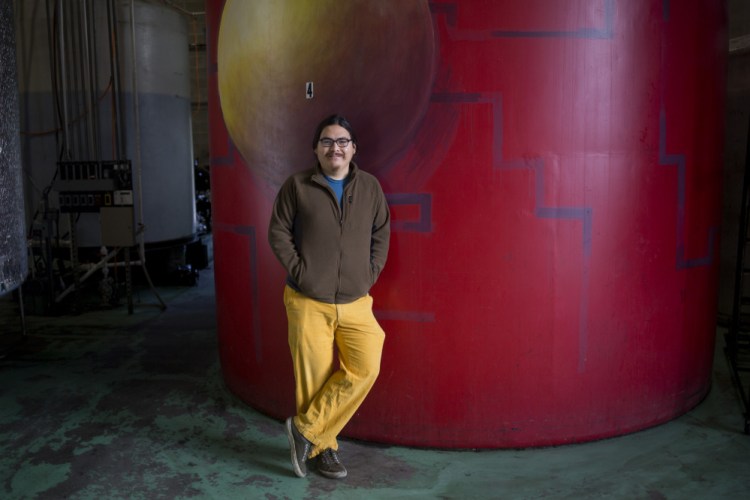Alex Pine is the director of outreach and technology at Maine Standard Biofuels, a Portland-based company that manufactures biodiesel from used cooking grease from restaurants around the state and beyond. He started as a customer of the company, signed on for an internship, worked as a summer employee and, after graduating from College of the Atlantic, joined the company full time.
FILL ‘ER UP: Pine is from Torrance, California, where he says he was not unusual in having a car in high school. But it was a 1987 Mercedes that ran on biodiesel. “I still have it. I don’t drive it anymore, but it is in a secure location.” When he drove it across the country to start school at College of the Atlantic, he wasn’t sure where he’d be filling up. Wasn’t that risky? “I had all the equipment for stockpiling fuel in my trunk,” he explained. “A little hand pump, cans.” He stopped at Maine Standard Biofuels to fill up. Then he kept coming back, fueling up in more ways than one. “Being a city kid, Bar Harbor kind of got to me after a few months.”
FAMILY BUSINESS: How does a college freshman get so comfortable with biofuel? Pine’s family founded a consumer cooperative for biodiesel in nearby Los Angeles when he was in middle school – inspired by a burning resentment over a sports car. OK, burning is probably too strong a word. Pine’s mother drove a sports car until she got pregnant with him. “My dad said, ‘It is not practical anymore, let’s sell it.’ ” His mother never stopped missing the car. “When I got to middle school, her minivan died, and she said, ‘I am never going back to a mom car again.’ ” They opted for a biodiesel VW Bug, but they didn’t know where they’d get fuel for it. Which inspired their connection – and partnership – with a group looking to start a cooperative. Pine started working there in middle school.
NATURAL FIT: His work at Maine Standard Biofuels includes giving tours and reaching out to the community to build awareness. “We’re really trying to change the paradigm of fuel here.” In any given week, he might work with students from the Collaborative School in New Gloucester or show around a group of volunteers from the Maine Organic Farmers and Gardeners Association. Or he could be talking to some far-flung customers. “We have one guy who comes from Jackman and a handful of people who actually come from Boston because it is hard to get fuel there.” Right now, Maine Standard Biofuels is the only commercial biodiesel manufacturer in the state.
FINE DINING: The company picks up from more than 900 restaurants all over Maine and as far south as Connecticut. How does that work? “We have a 55-gallon drum at the restaurant. They fill it up and then they call us. We’ve got a vacuum truck that sucks out all the oil.” Then it’s back to the plant for purifying and a chemical decanting process that allows the company to separate oil that is better suited for making soaps and cleansers (which it also makes). What’s left goes through a triple-state purification process, “and from there it is ready to be sold.” They deliver by truck to customers that include Oakhurst, Casco Bay Lines and Casella, which blend the biodiesel with petroleum.

Purified cooking oil that will eventually be turned into biodiesel and other bio-based cooking oil products at Maine Standard Biofuels.
FRENCH FRY FUEL: We’re always hearing that biodiesel smells like french fries. True? “Our exhaust smells like barbecue and Chinese food. I’m not quite sure why.” Pine says biofuel reflects whatever kind of oil it was made from or what the oil was used for. He remembers a bumper crop of walnut oil in California one year that led to some nutty-smelling cars traveling the freeways.
HEAD OF THE CLASS: What were the highlights of his education at the College of the Atlantic? “One which is very topical was our history of agriculture in Maine as seen through the lens of apples.” (That’s professor Todd Little-Seibold’s class.) Then there was the sustainable food systems class where he helped built a root cellar (things they don’t have in Torrance). That class continues to echo in his life. “I think there is an intrinsic tie between the energy we use to fuel our bodies and what we use for transportation.”
SURPRISE: Since Pine retired the Mercedes, he’s been experimenting with other forms of transportation. He rides his bike to work when he can, and the rest of the time he drives a leased electric Smart car. It’s a two-seater and costs him about $20 a month in electric bills. “It is kind of like my winter bicycle in a way,” he said. “It holds just about as much, but it keeps me out of the weather.”
LONG HAUL? Will Pine stick with the biodiesel business? “I don’t know. I am not one to plan ahead too much.” He’s happy where he is and enjoys his work, but in a broader sense, “I want to work on something that is benefiting the world, which is not just a 9-to-5 job. My passion really is for transportation and energy.”
Sounds like he’s in the driver’s seat.
Send questions/comments to the editors.



